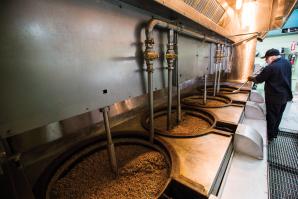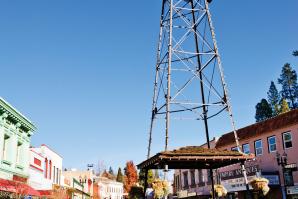When West Sacramento-based Clark Pacific went shopping for a third location to expand its precast concrete business, it found a home with a familiar name: the former Spreckels Sugar Mill, just outside Woodland.
“It’s completely compatible,” says Thomas Ketron, director of marketing for Clark Pacific.
Likewise, when a roller hockey league was priced out of Davis, it found a vacant warehouse in neighboring Woodland. Examples of commercial reuse are rippling through the city, where economic shifts have left behind cavernous warehouses in the industrial district and empty storefronts downtown.
The latest reuse, the opening of privately owned Cambridge Junior College in the nearly 100-year-old Porter building on Main Street, bodes well for the rest of downtown.
“It adds energy from having all those people there,” says Cynthia Shallit, Woodland’s redevelopment manager. “It enhances the sense of place.”
And several years down the road, downtown will get another boost when the Meier building, former home to a car dealership, reopens as restaurant space.
“Having new investment in the historic district is a shot in the arm for all businesses,” Shallit says. “It generates excitement and interest from other investors.”
She and other city officials hope these improvements put them closer to turning downtown into a “cultural entertainment district.”
In 2000 the Spreckels Sugar Mill closed, leaving behind a gold mine — for the right suitor. Meanwhile, Clark Pacific grew desperate for additional space but was determined to remain in Yolo County.
“Spreckels has all the infrastructure anyone could ever need,” says Wes Ervin, Yolo County economic development manager. “A huge water supply, a huge energy supply and lots and lots of industrial buildings.”
So in 2008 Clark Pacific acquired the former sugar beet mill and 240 acres from Imperial Sugar Co. The purchase price was not disclosed, but the mill was listed at $9.5 million. Clark Pacific also owns a third location in Fontana.
“We’ve been looking at Woodland for a long time. It’s underserved for the programs we offer.”
Dan Flores, chief executive officer, Cambridge Junior College
“(Spreckels) was already an industrial site; we just repurposed it,” Ketron says. “We went in and had to dig up the old foundation and create a flat space that was more appropriate for manufacturing.”
This was the second reuse of a sugar mill in Yolo County. After the Clarksburg Sugar Mill ended operations, the mill and 100-acre site was purchased for use as banquet facilities and space for several local wineries to rent tasting rooms.
But while the Clarksburg location near the Sacramento River may be inviting, it proved to be a roadblock for investors. Proposed elements of the operation, a hotel and housing, were deemed incompatible with the Delta Protection Act and shelved. By contrast, Clark Pacific didn’t have anything other than concrete in mind when it purchased the Spreckels site.
Early objections from the neighboring Historic Nelson Ranch and Cattle Co. were quickly squashed in court. Yolo officials agreed to Clark Pacific’s plans because the sugar mill had been built for agricultural and industrial use anyway, says David Morrison, Yolo County assistant director of planning and public works. The general plan was amended in 2008 to change the sugar mill’s designation from agricultural to industrial and amended again in 2009 to allow both.
Currently, the permit allows Clark Pacific to use 90 acres. Two-dozen people are employed at the Spreckels location, but close to 50 were working there last year when the company was building a rental car parking structure for the Norman Y. Mineta San Jose International Airport, Ketron says. The site can hold additional employees when the economy picks up, he says.
Meanwhile in Woodland’s industrial district, two guys have turned what was once a former distribution warehouse into roller hockey heaven. NorCal Indoor Sports is the brainchild of Ian Striegler and Randy Nunes, who leased the 64,000-square-foot warehouse on Tanforan Avenue last year when it became too expensive to lease the Davis Indoor Sports Center. DISC, as it is commonly known, is now used as a library while the Davis’ existing library is renovated.
“There will be a lot more people walking around buying things. It will show other businesses that there is more of a customer base.”
Cynthia Shallit, redevelopment manager, Woodland
In addition to serving as a home for roller hockey leagues, NorCal Indoor Sports is the new home for Woodland Gymnastics. And because it’s the only roller rink in town, it’s also become a popular place to host birthday parties.
“You could have 250 kids there on a Friday night,” says Wendy Ross, Woodland’s economic development manager. “Its nice to see a place for the teens and tweens.”
But there’s one drawback: the air conditioning. “It’s a tilt-up building, so it’s really hard to cool the place,” Striegler says.
He says roller hockey isn’t for the meek anyway. NorCal Indoor Sports uses only half of the warehouse but is planning to ask the city to expand the permit to include the other 32,000 square feet.
In Woodland’s downtown, reuse is inspiring hope of wholesale improvement. Last month, the nearly 100-year-old Porter building reopened its doors as Cambridge Junior College.
“We’ve been looking at Woodland for a long time,” says Dan Flores, the college’s founder, chief executive officer and primary shareholder. “It’s underserved for the programs we offer.”
The Yuba City-based private junior college offers programs in medical assisting and medical office reception and an associate degree in business administration. An agreement between Cambridge and the building owners, Bob and Lyn Martinez of Carmichael, was reached last year. The couple says they put $2 million into renovating the building; Cambridge added $500,000 in improvements, according to Flores.
The entire 10,000-square-foot first floor is leased to Cambridge. Bob Martinez says other businesses are interested in renting offices on the building’s second and third floors.
The Porter building, at the corner of Main and College streets, was designed by San Francisco architect Henry Weeks and built in 1913. It has Crawford ceilings and hardwood floors. It was intended as high-end offices for doctors and dentists, but in recent years was leased piecemeal to a bar, deli and comic book store, says Paul Hanson, the city’s lead planner.
Clark Pacific acquired the Spreckels Sugar Mill and 240 acres from Imperial Sugar Co. in 2008. The purchase price was not disclosed, but the mill was listed at $9.5 million.
“After a hundred years, the quality of clientele had hit rock bottom,” Hanson says.
The junior college campus was projected to have 90 students in attendance by the end of September, and eventually that figure is expected to grow. That’s great news for city officials who hope the Porter building turnaround will have a reinvigorating effect on neighboring shuttered storefronts.
“There will be a lot more people walking around buying things,” Shallit says. “It will show other businesses that there is more of a customer base.”
And more offerings are on the way about a block away in what was once a 20,000-square-foot Nash Rambler dealership. The Meier building was built in 1921 in Modern-style architecture, complete with transom windows.
“It represented the coming of the age of the automobile,” Hanson says.
But with its automobile heyday a distant memory, the historic Meier building on the corner of College and Bush streets was suffering a similar malaise as the Porter building. There was a Curves gym and a barbershop in what had been the office of the former dealership and even a batting cage in the showroom area.
Woodland developer Jeff Morgan purchased the building seven years ago and plans to transform it into French and Italian restaurants. A portion of the roof would be lopped off to create a courtyard, but Morgan says he plans to adhere to as much of the building’s original blueprints as possible.
“It’s a great location,” Morgan says. “It’s as dead center in the city as you can get.”
He plans to break ground on the project in 2012.
The Meier project is generating a lot of excitement in the city because of Morgan’s reputation of doing projects “to the nines.” Two years ago he purchased the former senior center and Jehovah’s Witness hall for $1.5 million from the city and transformed it into an office for his development company, BlackPine Holdings Inc.
The office lobby has the feel of an old English garage, and throughout the building there are furniture pieces imported from France or found at auctions.
Recommended For You

Striking Oil
In Woodland, La Tourangelle cracks the nut oil market
Pulling up to the bland business park that is home to La Tourangelle’s nut oil bottling facility gives no indication of the nexus of culinary artistry housed inside.
But step through the doors and start talking to Matthieu Kohlmeyer, the energetic founder and CEO of the Woodland company, and you’ll discover that this quiet farming town is home to a vibrant French connection and a business that’s ridden the wave of consumer health trends and successfully plugged into the farm-to-fork movement.

Up & Down Main Street
Small town realities and the long road to prosperity
Say what you will about the severity of state and federal budget woes, but it’s arguably the small towns that are bearing the real brunt of today’s economy.



